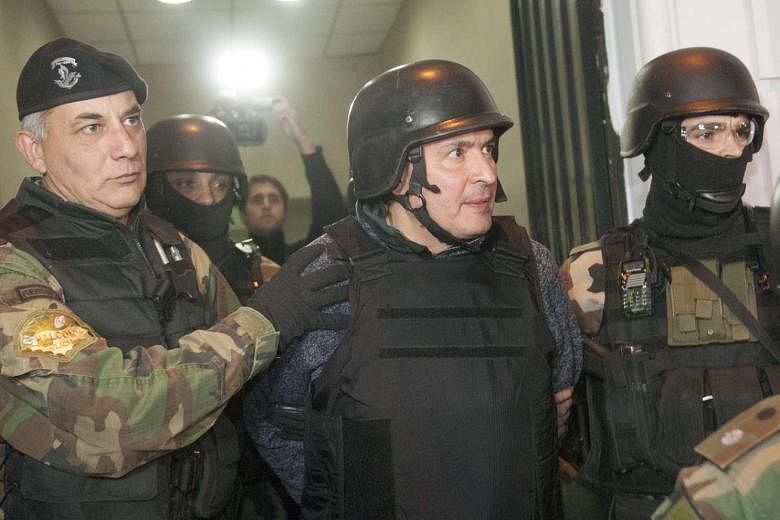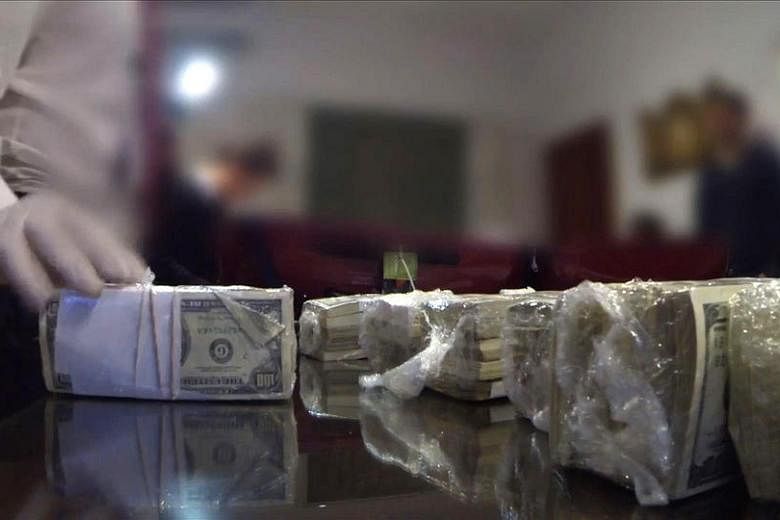BUENOS AIRES (AFP) - It's been a heck of a week for Jose Lopez, an Argentine former Cabinet minister who was arrested trying to hide bags stuffed with cash and jewels at a monastery.
On Monday (June 13), Lopez, 55, seemed like any ordinary politician, with a slight paunch, greying hair and a fairly anodyne job as a member of the South American regional Parliament.
On Tuesday, he was caught red-handed tossing 160 suitcases and duffel bags containing more than US$9 million (S$12.12 million) over a wall into the garden of an old monastery outside Buenos Aires.
On Wednesday, his lawyer said he was delirious and suffering hallucinations.
And on Thursday, he showed up at his first court appearance hitting himself on the head, shouting and demanding cocaine.
His lawyer, Ms Fernanda Herrera, who is better known in Argentina as a cumbia singer and former model, said her client is mentally unfit to testify.
Ms Herrera, a curvaceous peroxide blonde, had an ambulance take Lopez to the hospital Wednesday after his arrest.
But doctors who examined him said they found nothing wrong besides stress and high blood pressure.
The bizarre case is scandalous even by the standards of Argentina, a country that has been around the block a few times when it comes to corruption.
Lopez served for 12 years in the Cabinets of Argentina's last two presidents, Nestor and Cristina Kirchner, as the deputy minister for public works.
His unexplained bags of cash have embarrassed the left-wing power couple's party, the Front for Victory, which is still stinging from losing the presidency to business-friendly conservative Mauricio Macri in December.
Lopez and his former boss, former planning minister Julio de Vido, managed the federal government's public works projects under the Kirchners (2003 to 2015).
They were the only two ministers to survive the various Cabinet reshuffles across the couple's 12 years in power.
The two elderly nuns who now live at the old monastery said Lopez and Mr De Vido were regular visitors who would stop by with late archbishop Ruben Di Monte, a close ally of the Kirchners, who died in April.
Lopez "is a very good man. He used to come every year to help us", said one.
The other nun, who was present when Lopez was arrested, was not so sure. She said he was "half crazy" and told her: "They're going to put me in jail... because I stole money to help you."
Investigators are now trying to figure out how Lopez amassed a stash of cash, jewels and luxury watches so large it took police nearly 22 hours to count it all.
The total came to US$8,982,047, plus €153,610, 49,800 Argentine pesos, 425 yuan and two Qatari riyals, officials said.
Since Mr Macri came to power in December vowing to crack down on graft, the authorities have opened sweeping investigations into alleged corruption, money laundering and tax evasion by the Kirchners and their inner circle.
Mrs Cristina Kirchner is facing money-laundering and embezzlement accusations and an indictment for depleting state coffers by having the central bank sell dollar futures at an artificially low price.
Several business executives close to her and her late husband are under investigation for illicit enrichment.
The former head of the Argentine court of auditors, Mr Leandro Despouy, says he long suspected the Kirchners' inner circle was diverting huge sums of cash from public works projects.
"The dirty money was always in cash," said Mr Despouy, who served from 2002 to 2016.
"In public works projects, there's a very clear way to accumulate money. Advances were paid whether construction started or not, and in cash."
The problem, he said, was how to hide the money.
He said he used to have nightmares about where it could be.
"There was no way to get it out of the country," he said. "The only way was to bury it."
Mr Macri came to power in December promising a sea change in Argentine politics.
But he now faces corruption allegations of his own.
The president is under investigation for suspected tax evasion after his name came up in the Panama Papers leaks of offshore accounts in tax havens.
He denies wrongdoing.



